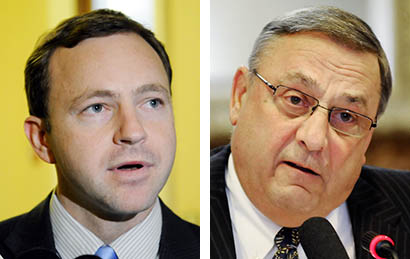Maine House Speaker Mark Eves is urging the Attorney General’s Office to “move forward” with sanctions after the first meeting of a special commission on education funding met in an illegal closed-door meeting Monday at the Blaine House.
“Due to the serious implications of this violation of the public access law, especially when discussing something as important as the education of Maine children, we urge you to move forward with available sanctions to ensure that future meetings of this commission and all other public proceedings will be open to the public and held with ample notice,” Eves wrote in a letter on Tuesday.
A violation of the state’s open meeting law, which is covered under the Freedom of Access Act, is a civil violation punishable by a fine of up to $500. All of the attendees would be in violation of the law, according to Sigmund Schutz, the Portland Press Herald’s attorney.
A dozen of the 15 commission members in attendance on Monday are elected or appointed public officials whose official communications are subject to FOAA law and they are expected to know the law.
In a radio show Monday, LePage, who was a member of the commission, said he was withdrawing from the group because of the media’s coverage.
“And I’ll tell you why. Very simple. What the press wants, I have lived under the press of five years. The press takes seven seconds of what I say and they make a (expletive)-show out of it. I’m tired of it. I’m not going to participate,” he told George Hale and Ric Tyler on their WVOM morning talk show Tuesday morning. “I’m not going to be involved in an organization or any committee that throwing ideas around is going to be politically sensitive and is going to be on the front page of every newspaper.”
According to the state Department of Education, Deputy Commissioner Bill Beardsley will remain chairman of the commission.
Two Democratic lawmakers on the Legislature’s Education and Cultural Affairs Committee and several other people were refused entry when they tried to attend the first meeting of the Commission To Reform Public Education Funding and Improve Student Performance. Later that day, Assistant Attorney General Brenda Kielty said the meeting should have been open under the state’s Freedom of Access Act.
On Tuesday, the spokesman of the Attorney General’s Office declined to say what the department would do in response to Eves’ letter.
“As Public Access Ombudsman AAG Brenda Kielty stated yesterday, we are not aware of any exemption to the public access laws that would have allowed the first meeting of the Commission to Reform Public Education and Improve Student Performance in Maine to occur in a private setting. We will be reviewing information we have received before proceeding or commenting further,” spokesman Timothy Feeley said in an email.
On Monday, LePage’s staff repeatedly described the three-hour meeting, complete with multiple speakers and a printed agenda, as a “breakfast” and an “informal” gathering. The governor’s spokeswoman refused to directly addressed the AG’s opinion that the meeting was illegal.
One commission member, Senate Minority Leader Justin Alfond, D-Portland, said he objected to the closed-door policy as the meeting got underway.
“After our introductions, I asked to speak and I said that ‘I am very uncomfortable having a private meeting doing the public’s work in the Blaine House,’ ” Alfond said afterward. ” ‘This is getting the commission off on the wrong foot, possibly violating laws around freedom of access and I don’t think this is a smart move.’ ”
Alfond said LePage told him that anyone who was uncomfortable was welcome to leave, but no one left the meeting. At that point, Alfond said, the meeting continued without further discussion about it being a closed meeting.
“I made the choice to stay at the table to represent my constituents and caucus because the education of our children is fundamental to the success of our state,” said commission member and Assistant Majority Leader Sara Gideon, D-Freeport. “Despite our repeated requests for an open meeting, the governor insisted today on closed doors. There is no question this meeting would have happened with or without us.”
Alfond said there was nothing controversial about the substance of the closed-door meeting. The group heard from LePage and then was briefed on several issues, including K-12 enrollments and cost trends, state tax revenues and the University of Maine System. LePage, in his comments, did not set out any parameters or limitations of the commission’s future work, he said.
The group decided it would focus initially on education funding and certain academic goals, such as having students reading proficiently by third grade, a benchmark indicator of future academic success. The next meeting will be on June 6 at Oxford Hills Comprehensive High School in South Paris.
In addition to Beardsley, Alfond and Gideon, other members of the commission are: Sen. Garrett Mason, R-Lisbon Falls; Rep. Kenneth Fredette, R-Newport; State Board of Education and Maine Charter School Commission member Jana Lapoint; 2016 Maine Teacher of the Year Talya Edlund; Charter School Commission member J. Michael Wilhelm; Lewiston Regional Technical Center Director Robert Callahan; second-grade teacher Douglas Larlee; South Portland Assistant City Manager Joshua Reny; School Administrative Unit Superintendent Richard Colpitts; University of Maine System Chancellor James H. Page; and Maine Community College System President Derek Langhauser.
Noel K. Gallagher can be reached at 791-6387 or at:
Twitter: noelinmaine
Send questions/comments to the editors.



